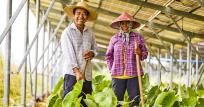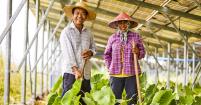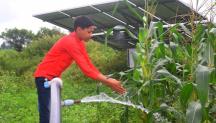

Joint FAO-IRENA Report on Renewable Energy for Agri-food Systems Launched at COP26
Newsletter
Report tables recommendations for decision makers in pursuit of Sustainable Development Goals and the Paris Agreement.
Abu Dhabi, United Arab Emirates / Rome, Italy, 4 November 2021 – The production, distribution and consumption of food uses about a third of the world’s energy and is responsible for about a third of global greenhouse gas emissions, making its decoupling from fossil fuels a priority in the fight against climate change.
A new report launched today on the sidelines of the UN’s Climate Change Conference (COP26) in Glasgow explores the relationship between the world’s agri-food systems and renewable energy and argues that solutions are within our grasp.
Solar irrigation, for example, is being widely adopted to improve access to water, enabling multiple cropping cycles and increasing resilience to changing rainfall patterns. In India, the use of solar irrigation pumps has raised farmers’ incomes by at least 50 per cent compared to rain-fed irrigation; in Rwanda, smallholder farmers’ yields have grown by about a third.
The report, Renewable energy for agri-food systems – Towards the Sustainable Development Goals and the Paris agreement, is the result of a joint effort between the Food and Agriculture Organization (FAO) and the International Renewable Energy Agency (IRENA).
“Making sure the agri-food systems continue to meet the world’s food demand in a sustainable manner is one of our big challenges today. Achieving food security without fossil fuels while stimulating socio-economic benefits is possible, if we choose action to accelerate the adoption of renewable energy solutions to power the agri-food systems,” Francesco La Camera, Director-General of IRENA.
“The report shows that there are many opportunities to implement renewable energy solutions across agri-food systems,” FAO Director-General QU Dongyu said in a video message to participants in which he also stressed the importance of making innovative technologies accessible to small farmers. QU was joined for the launch by Francesco La Camera, Director-General of IRENA.
The 89-page report breaks down unhelpful silos between energy and agri-food policies by providing recommendations for decision makers. These include better data collection to guide renewable energy investments, improved access to finance for end users and businesses, and a greater focus on raising awareness and building capacity.
“The partnership between IRENA and FAO reflects our commitment to break these silos by working together to implement cross-cutting actions,” Qu said.
A third of agri-food emissions stem from energy use, and the report comes against the backdrop of a more than 20 percent rise in energy consumption for the production, distribution and consumption of food between 2000 and 2018. That growth has been mainly driven by mechanisation in Asia in the form of irrigation pumps, farm machinery, processing equipment and inputs such as fertilisers. Energy use in Africa, which hosts around 15 percent of the global population and faces growing food demand, has remained largely constant, accounting for only about 4 percent of global energy consumption in agri-food systems.
Read the full report.




